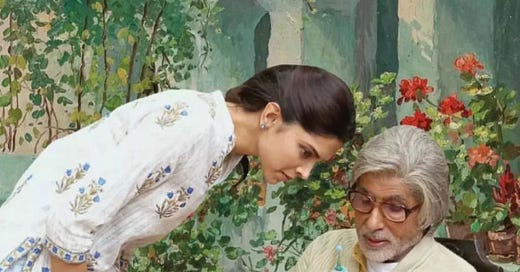I have loved reading Austen’s works and watching Bollywood movies for as long as I can remember. It is fascinating to see how literature shapes itself into celluloid. Before anyone tries to one-up me, I am aware that the 2010 movie, Aisha starring Sonam Kapoor, is a stunningly accurate remake of Jane Austen’s much-celebrated novel, Emma. However, I have always held the belief that stories translate beyond mere remakes. You find them everywhere. Maybe in another person, or perhaps in a similar paragraph in a book, or in this case, another movie. Re-reading Emma made me realize that, alongside Aisha, she reminded me a lot of Shoojit Sircar’s principal character, Piku.
Jane Austen describes Emma as a character whom no one but she herself would like. Rightfully so, because the 23-year-old Emma comes off as an agonizingly righteous yet intelligent woman whose ‘matchmaking’ sensibilities are rooted in social hierarchies. Living in the fictional town of Highbury with a hypochondriac and widowed father, Emma desires very little for herself, not even marriage. Since the Woodhouses are one of the richest families in Highbury, Emma does not need a gentleman. Despite being adored by everyone, Mr. Knightley, her brother-in-law and friend, is objective enough to find faults in her. As the plot thickens through some drama, the readers are made to realize that Emma has always harbored a deep respect and profound inclination towards the former. This explicitly comes forth during a picnic at his estate. The novel ends with Mr. Knightley reciprocating her feelings and a mutual understanding of Emma’s responsibilities towards her father, which ensured that she was not separated from her estate altogether.
Piku is also a domestic movie with a somewhat overlapping yet different undertone. It shows the story of an approximately 50 year old, Piku taking care of her hypochondriac father, who was mainly suffering from constipation. The plot is light, humorous, and focuses on remembrance and family. Furthermore, there is a subplot of a friendship-turned-romance between Piku and Rana, the owner of the taxi service that Piku frequently used. Their connection strengthens when he offers to drive the family to their ancestral home in Kolkata, West Bengal, from Delhi. Rana enters her life with not only quiet empathy but also objectivity, which is reminiscent of Mr. Knightley.
It is the complexity of the female protagonists that struck me the most, along with their ideas about independence. True, Emma’s conditions were far more favorable for her than for any other woman in 18th-century England due to her higher social rank. It was interesting to note that their love for their respective fathers formed the basis of their autonomy. They were not ‘tied’ to their homes out of compulsion but out of choice and responsibility. Furthermore, Sircar’s and Austen’s heroines are not tailored to be likable. Their thoughts come on strong and unapologetically. Piku is hotheaded, practical, and reserved, while Emma is astute, too self-assured, and bestowed with an amiable openness. Her bias towards those belonging to ranks lower than her own, as seen in her scrutiny of Martin, the farmer who had proposed to her friend, Harriet Smith, is somewhat understandable, but still condemnable. While hierarchies are not eliminated, Mr. Knightley’s ire and eventually the denouement of the plot help Emma rectify her flaws. In Piku’s case, the first half of the movie deals with her being at odds with her father for wanting to sell their ancestral home. Her decisions, while falling in step with the changing time that magnified the need for profit over memory, stood corrected when Rana reminded her of the impermanence of the same.
It is essential to remember that the stories do not make romance their focal points. Rather, they focus on the individual journeys of their heroines. They neither magnify their faults nor pander to their goodness. The stories are humane and homely, like all of us. Another very minor point of similarity is the reluctance of both fathers to marry off their daughters. Not entirely shocking.
Indeed, there is a difference in circumstance due to the vast variation in the time periods the two are set in. Piku has the agency to explore her sexuality. She remarks, “sex is a need”, when one of her relatives enquires about it. Emma, on the other hand, has no such luxury. Both the movie and the book are not similar in terms of their plot, but in the treatment of their heroines. It becomes rather fascinating to see how ideas and the experience of womanhood transcend beyond time.
(I exceptionally loved Piku’s outfits in the movie. Here’s to filling my closet with all those styles).
Have a fantastic week ahead!







THIS is what i mean when i say i love seeing multi-media art and storytelling🫶🫶🫶 such a sweet, simple and strong analysis of both these characters!!!
Loved this! I’ve never read the book or seen the movie starring Anya Taylor joy but I know a little about Jane Austen and this perfectly makes sense. When I read the title, I thought, how can piku and Emma be similar? But then I read it and understood why. It’s all about the strong female characters who know how to stand up for themselves and for their loved ones. Piku’s one of my favorite movies. And yes, deepika’s outfits are absolutely a vibe!!!